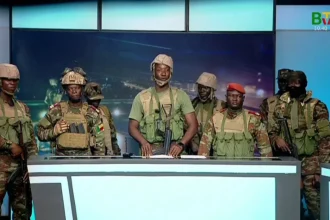Catholic pontiff, Pope Francis on Saturday defied the threat of insecurity and COVID-19 to meet with the world’s Shiite Muslim leader, Grand Ayatollah Ali Sistani to address the plight of Christians living in Iraq.
The historic meeting in the Iraqi city of Najaf, which has been described as the first-ever papal visit, on Saturday marked a landmark moment in modern religious history.
The papacy disclosed that the visit, a clear defiance of the second wave of coronavirus cases and renewed security fears, was to deepen his dialogue with other religions.
The meeting between the two religious leaders lasted 50 minutes, with Sistani’s office putting out a statement shortly afterward thanking Francis, 84, for visiting the holy city of Najaf.
The Grand Ayatollah affirmed his concerns that Christian citizens should live like all Iraqis in peace and security, and with their full constitutional rights.
His office published an image of the two, neither wearing masks: Sistani in a black turban with his wispy grey beard reaching down to his black robe and Francis all in white, looking directly at the grand ayatollah.
Sistani is extremely reclusive and rarely grants meetings but made an exception to host Francis, an outspoken proponent of interreligious dialogue.
The Pope had landed earlier at Najaf airport, where posters had been set up featuring a famous saying by Ali, the fourth caliph and the Prophet Mohammed’s relative, who is buried in the holy city.
“People are of two kinds, either your brothers in faith or your equals in humanity,” read the banners.
It took months of careful negotiations between Najaf and the Vatican to secure the one-on-one meeting.
“We feel proud of what this visit represents and we thank those who made it possible,” said Mohamed Ali Bahr al-Ulum, a senior cleric in Najaf.
Pope Francis, a strong proponent of interfaith dialogue, has met top Sunni clerics in several Muslim-majority countries, including Bangladesh, Morocco, Turkey, and the United Arab Emirates.
Sistani, meanwhile, is followed by most of the world’s 200 million Shiites — a minority among Muslims but the majority in Iraq — and is a national figure for Iraqis.
According to Cardinal Miguel Angel Ayuso Guixot, the head of the Pontifical Council for Interreligious Dialogue and a specialist in Islamic studies, “Ali Sistani is a religious leader with a high moral authority.”
Sistani began his religious studies at the age of five, climbing through the ranks of Shiite clergy to grand ayatollah in the 1990s.
While Saddam Hussein was in power, he languished under house arrest for years but emerged after the US-led invasion toppled the repressive regime in 2003 to play an unprecedented public role.
In 2019, he stood with Iraqi protesters demanding better public services and rejecting external interference in Iraq’s domestic affairs.
On Friday in Baghdad, Pope Francis made a similar plea.
“May partisan interests cease, those outside interests who don’t take into account the local population,” Francis said.











